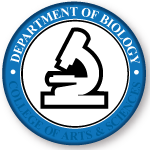Document Type
Article
Publication Date
9-28-2023
Publication Title
Bioorganic & Medicinal Chemistry
Volume
94
Abstract
Gram-negative strains are intrinsically resistant to most antibiotics due to the robust and impermeable characteristic of their outer membrane. Self-assembling cationic peptide amphiphiles (PAs) have the ability to disrupt bacteria membranes, constituting an excellent antibacterial alternative to small molecule drugs that can be used alone or as antibiotic adjuvants to overcome bacteria resistance. PA1 (C16KHKHK), self-assembled into micelles, which exhibited low antibacterial activity against all strains tested, and showed strong synergistic antibacterial activity in combination with Vancomycin with a Fractional Inhibitory Concentration index (FICi) of 0.15 against E. coli. The molecules, PA2 (C16KRKR) and PA3 (C16AAAKRKR), also self-assembled into micelles, displayed a broad-spectrum antibacterial activity against all strains tested, and low susceptibility to resistance development over 21 days. Finally, PA1, PA 2 and PA3 displayed low cytotoxicity against mammalian cells, and PA2 showed a potent antibacterial activity and low toxicity in preliminary in vivo models using G. mellonella. The results show that PAs are a great platform for the future development of effective antibiotics to slow down the antibiotic resistance and can act as antibiotic adjuvants with synergistic mechanism of action, which can be repurposed for use with existing antibiotics commonly used to treat gram-positive bacteria to treat infections caused by gram-negative bacteria.
Recommended Citation
H. Xing, V. Loya-Perez, J. Franzen, P.W. Denton, M. Conda-Sheridan, N. Rodrigues de Almeida, Designing Peptide Amphiphiles as novel antibacterials and antibiotic adjuvants against Gram-negative bacteria, Bioorganic & Medicinal Chemistry (2023), doi: https://doi.org/10.1016/j.bmc.2023.117481
Files over 3MB may be slow to open. For best results, right-click and select "save as..."


Comments
This is an Accepted Manuscript of an article published by Elsevier in Bioorganic & Medicinal Chemistry on [September 28, 2023], available online: https://doi.org/10.1016/j.bmc.2023.117481